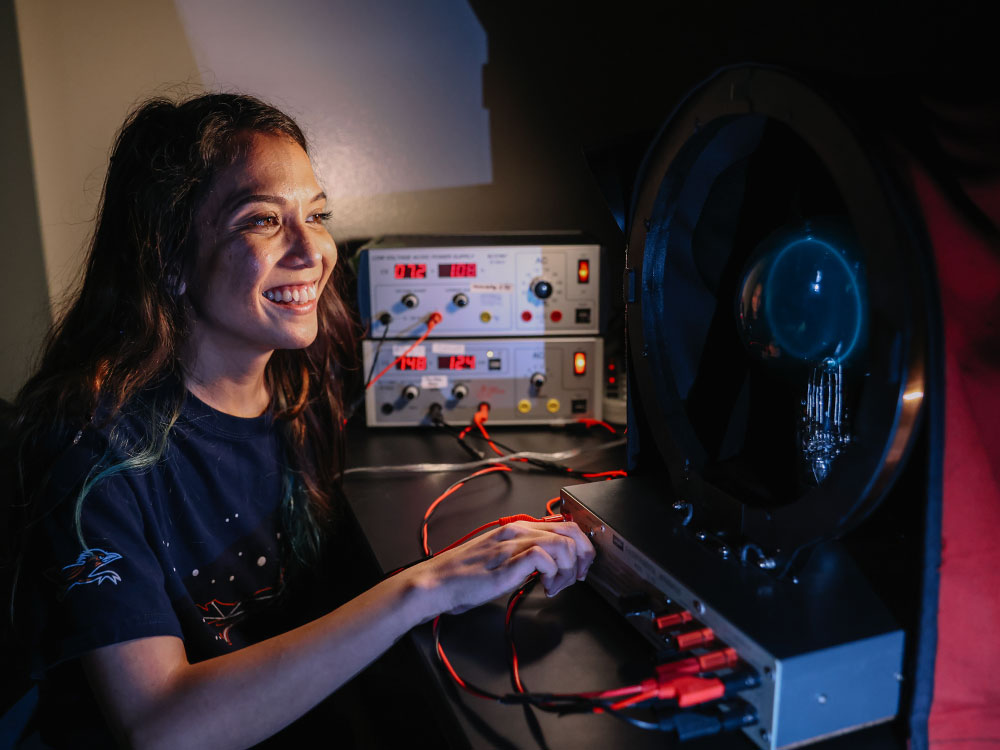
Why Pursue a Master's Degree in Physics
UT San Antonio’s Department of Physics and Astronomy offers the 5th largest graduate program of Physics in Texas. This joint program offers graduate students the opportunity to work one-on-one with their faculty advisors and other core scientists from the Southwest Research Institute Space Science and Engineering Division.

Research
The Department of Physics and Astronomy offers research opportunities in six principal areas:
- Astrophysics and Cosmology
- Biophysics
- Computational Physics
- Condensed Matter Physics
- Materials Science
- Nanotechnology and Ultramicroscopy
Collaboration is encouraged among different research groups, across campus, and with other institutions, including the Space Physics and Instrumentation Graduate program with Southwest Research Institute.
Admission & Application Requirements
Applications are submitted through the UT San Antonio Graduate Application. Please upload all required documents (listed below) on your UT San Antonio Graduate Application. It is the applicant’s responsibility to ensure completion and submission of the application, a nonrefundable application fee, and all required supporting documents are on file with UT San Antonio by the appropriate application deadline.
| Physics (MS) | ||
|---|---|---|
| Required Degree | Bachelor's Degree from an accredited college or university in the United States or have proof of equivalent training at a foreign institution. | |
| Minimum GPA | 3.0 (on a 4.0 scale) Departments may consider GPA of last 60 semester credit hours | |
| Coursework | Completed adequate credit hours or foreign institution equivalent coursework as preparation for the program. | |
| Transcripts* | Required from all institutions attended; international transcripts must be recorded/translated to English | |
| Credential Evaluation | Required if you have earned university-level credit from foreign institutions. Submit an evaluation of your transcripts from FCSA or any NACES-approved credential evaluation agency. | |
| English Language Proficiency | 79 TOEFL iBT / 6.5 IELTS / Duolingo 100 For exams taken on or after January 21, 2026: We require a minimum TOEFL iBT score of 4.0. |
|
| Purpose Statement | Required | |
| Resume | Required | |
| Letters of Recommendation | 2 academic or professional reference(s) demonstrating your attributes for successful completion of this program (you will request these through the Graduate Admissions Application; let your recommenders know of your deadline to ensure submissions are on time) | |
| *Unofficial transcripts will be taken into consideration for admissions; however, if admitted into the program, you must submit official transcripts to the University. | ||
Application Deadlines
Applicants are encouraged to have their admission file completed as early as possible. All applications, required documents and letters of recommendation, if applicable, must be submitted by 5:00 PM U.S. Central Time on the day of the deadline. Deadlines are subject to change.
| Physics (MS) | |||
|---|---|---|---|
| Timing on Admission Decision: Completed applications will be reviewed for admission after the deadlines below. Decisions will be made and sent to applicants within a few weeks after the review date. | |||
| Application Deadlines for: | Priority | International | Domestic |
| Spring 2026 | Not Available | November 1 | December 1 |
| Summer 2026 | Not Available | May 1 | May 1 |
| Fall 2026 | March 1 | June 1 | June 1 |
| Spring 2027 | Not Available | November 1 | December 1 |
| Summer 2027 | Not Available | May 1 | May 1 |
Funding Opportunities
A limited number of teaching or research assistantships and fellowships are available to qualified students. Financial assistance is limited and awarded on a competitive basis.
For information about graduate fellowships, click below.
Learn moreCareer Options
UT San Antonio prepares you for future careers that are in demand. The possible careers below are based on data pulled by a third-party tool called Emsi, which pulls information from sources like the U.S. Bureau of Labor Statistics, U.S. Census Bureau, online job postings, other government databases and more to give you regional and national career outlook related to this academic program.
The Master’s in Physics offers students the opportunity to pursue graduate coursework in a variety of basic Physics fields, including:
- Mechanics: classical, quantum, statistical and fluid
- Electrodynamics
- Biophysics
- Plasma Physics and Magnetohydrodynamics
- Solid State Physics
- Optics: nonlinear, biophotonics, and lasers
- Mathematical & Computational Physics
Other special topics courses will include:
- Theoretical Physics
- General Relativity
- Cosmology
- Advanced Condensed Matter Physics
- Quantum Field Theory
- Particle Physics.
This program is housed on Main Campus. Courses are offered at various times of the day generally scheduled later in the afternoon.

